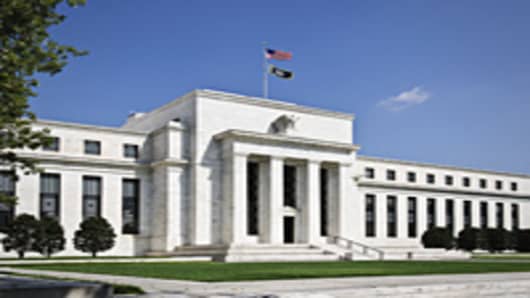The Federal Reserve will boost its balance sheet by about half a trillion dollars over a six-month period beginning in November and keep it inflated for up to a year, according to a survey of leading markets participants by CNBC.
About 70 percent of the 67 respondents, which include economists, strategists and fund managers, believe the Fed will begin quantitative easing again.
Of those, 80 percent believe the Fed will start before the end of this year. November is seen as the most likely month for the Fed to restart asset purchases by 38 percent of those who took the survey, but December was a close second with 32 percent.
“The trigger for the resumption of quantitative easing late this year will be an increase in unemployment back into double-digits,” wrote Mark Zandi, of Moody’s Economy.Com. He thinks the Fed will act in December and ultimately purchase an additional $1 trillion in assets.
The surveyis among the first efforts to quantify market expectations for when and by how much the Fed will restart quantitative easing, or asset purchases, as is widely expected. Before the Fed Funds rate was lowered to zero, the Fed futures markets served as a proxy for market expectations for actions by the central bank.
The Fed has made clear that the size of the balance sheet is now a major tool for aiding the economy yet there is no obvious proxy for gauging market sentiment. CNBC will conduct the survey periodically to gauge how market expectations for the Fed change with incoming economic data and statements by Fed officials.
There is a wide range of answers surrounding the key unknown of how much the Fed will buy in assets.The average for the survey put the portfolio at $2.35 trillion by Feb. 1, growing to $2.5 trillion by August 2011. The Fed is expected to remain around that level through November, 2011. The Fed’s portfolio is currently targeted at $2.054 trillion, meaning market participants expect the portfolio to grow an average by about $500 billion by August.
At their September meeting, Fed officials hinted strongly that they would restart asset purchases, saying the Federal Open Market Committee “is prepared to provide additional accommodation if needed to support the economic recovery and to return inflation, over time, to levels consistent with its mandate.”
But Fed officials have not so far offered any guidance for how much they would add to the portfolio. The Fed kept its balance sheet at about $800 billion before the financial crisis but raised it by nearly $1.5 trillion through the purchase of treasuries and mortgage-backed securities along with toxic assets it took on its balance sheet through the rescues of AIG and Bear Stearns.
The lack of guidance, along with differences over the economic outlook, results in a wide range of estimates from respondents for the size of the balance sheet through November 2011. In fact, 22 percent believe the balance sheet will be smaller by then than it is now, with the low coming in at $1 trillion, meaning a reduction in the portfolio by $1 trillion from the current level of $2 trillion.
Nearly 30 percent think the portfolio will be more than $1 trillion dollars larger, with the high at $4.1 trillion.
“If the Fed pulls the trigger, they will go big,” wrote Stephen Stanley of Pierpont Securities. He sees the balance sheet hitting $3 trillion by August.
Market participants believe the move will help lower interest rates, with 57 percent saying it would be totally or somewhat effective. About 38 percent think it will be ineffective and 6 percent unsure.
David Resler of Nomura Securities said lowering interest is not the principal goal of additional QE. Rather, he said will purchase assets to ward off deflation and boost inflation expectations.
Mark Vitner of Wells Fargo said: “There will only be a modest impact on interest rates… because the move is more widely expected and interest rates are already so low.”
Others were skeptical of the impact. Mark Elenowitz of TriPoint Global Equities wrote that he sees little impact because rates are already low. “My fear is that instead of prompting economic activity through sustained low interest rates, the Fed may provoke a debilitating bout of inflation,’’ he said. Others thought the Fed will have some impact, but at a cost of a very painful exit strategy.
Purchasing assets is just one of the actions the Fed could take. It has also said it could lower the interest rate paid on excess reserves, now at 25 basis points, and can make an even firmer commitment to keep rates low for longer.



